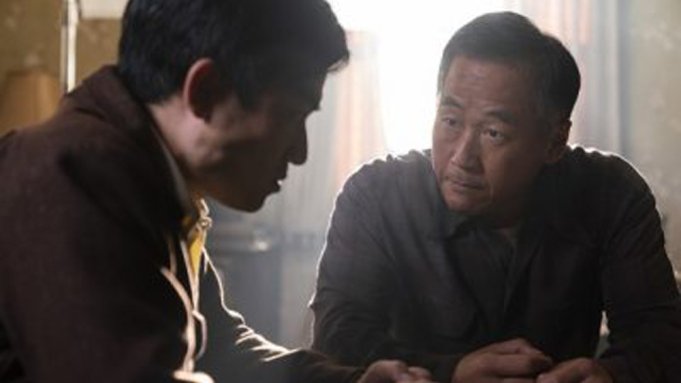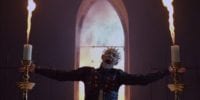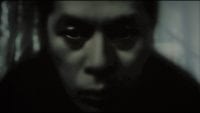Sometimes the living are as scary as the dead, and the truth is as terrifying as a myth. The Terror: Infamy uses its first episode, “A Sparrow in a Swallow’s Nest,” to set out its stall in this regard, and by the end there is a sinking feeling in your stomach, and the supernatural is only part of the cause.
How to Be a Man
The story for this edition of the anthology series (think True Detective but horror) centres on the Nakayama family on Terminal Island, San Pedro, California in 1941.
There are clear conflicts amongst the family. Son Chester is American-born, with his father, Henry, and mother, Asako, having left Japan for America at least 20 years earlier and suffering the indignities and struggles of being the first immigrants to settle in a community not used to or prepared for them (ironic, considering American history).
Chester has the benefit of being an American-born citizen. While no stranger to being considered “the Other” by a mistrustful community, he has reaped the benefit of his parents’ struggles, a fact he seems ignorant of. He studied photography in college, an opportunity his parents could only have dreamed of.
But Chester is quick to deride his father for what he sees as a small, provincial, fearful attitude when he says, “I wish I could’ve gotten to take you out in my pop’s Packard. It’s jet black, so pretty. All he does is take it in circles around that tiny island. They come from one island to an even smaller island. That’s their entire world. I can’t do that.” He cannot understand his parents’ sacrifices as he has not had to make any of his own. Until now (but we’ll return to this shortly…).
When Chester accuses his father of not being a man, his father gives a little bit of personal history: “In Japan my father don’t even have his own ox. I pull cart myself. I come here, all I ever want is automobile, a cart to pull me. It took 20 years, but I got it. So what if they take my car? I’m still the same man, a man who earned his Packard. Don’t you tell me how to be a man, boy.” Henry has achieved a kind of dignity through incredibly hard toil and change (quite an uneasy feeling in the context of the show when you consider what the sign on the gates of Auschwitz read). He has earned the right to call himself a man.

It is quite clear that Chester doesn’t realise that his parents’, and indeed his community’s, move from Japan to America and the struggles therein, the struggles to be accepted by a community that doesn’t really want them, was braver, more adventurous than going to university in California. Chester dreams big but doesn’t see that in their own way, his parents did what he is yet to do.
Meanwhile, Chester’s mother, Asako, is fearful of spirits that she believes have followed them across the sea from Japan. In this instance she raises the ire of not only Chester and Henry but the local Japanese community. She enters the house of local widower, Mr. Furuya, to initiate a ceremony of protection against evil spirits, only to be asked angrily to leave.
To Chester, American born and bred, the clinging on to spirits and myths of the past is a way to avoid moving into the future, of avoiding the uncertainty of making the most of the opportunity of America before them. He neglects to understand that the spirits are a very real part of a culture they were nurtured in, a culture that in some ways he has only experienced second hand, or in a diluted form.
If the Japanese elders of the community seem uncomfortable with the talk of spirits, it is only because they have one foot still in the race. They still believe.
And unfortunately for all concerned, it appears that Asako might be right…
This Terrible Thing We Did
When the episode opens, we see a lady in ceremonial dress finish her preparations. We follow her feet as she walks along a wooden jetty, but something is not right: her feet buckle. We look up and her neck and head jerk in ways that look convulsive. Is she hurt? Is she possessed?
She sits down on the jetty and observes the water in front of her. And of course inserts a long needle from her hair into her ear and through her head, killing herself near-instantly. The whole scene takes place with minimal music, just natural sounds to accompany it, ramping up the unease of the scene and the severity of the death.

All is not well on Terminal Island.
We learn that the lady’s name is Mrs. Furuya and that Chester may know more about the reasons for her self-demise than he would like people to know.
In secret, Chester has been engaged in a physical relationship with Luz, who is Mexican-American. Perhaps they could both relate to the feeling of belonging to two different cultures yet being neither here nor there. Perhaps they found solace in each other because of or in spite of this.
In any case, nature took its course and Luz fell pregnant. Chester had contacted Mrs. Furuya and asked her to concoct some form of remedy that would help to terminate the pregnancy. Chester comments how Mrs. Furuya didn’t want to do it (although he doesn’t elaborate on why) and that he believes it was guilt at her actions that led her to kill herself.
Mr. Furuya must concur, as he slams the bottles of remedy into Chester’s hands and calls him a coward. It is implied that if Chester had taken responsibility for his actions and had decided to keep the baby then his wife would still be alive.
Later on, Chester will attempt to do just that and take on that particular responsibility. He tries to convince Juanita that they could run away and start a new life. But where could they go to? Luz shoots him down with a heart-breaking logic that one assumes has been learnt the hard way:
“How well do you know me? Enough to run off? Enough to raise a baby? There’s no future if we stay in California, unless the law changes. Forget marriage. How much money have we got? Who do we know? How are we going to find work? What if we get stopped crossing state lines? Chester, in the morning, you’ll see we can’t. There’s no future for us anywhere.”
Chester takes it gracefully and with good humour but the modest smile cannot hide the disquiet in his eyes. This hurts. That it should come down to skin, accent and culture, it hurts. The eyes betray a hard-earned truth: Chester knows he’s not as free in the promised land as his rhetoric protests itself to his family.

Old-Country Hauntings
And what of the hauntings? Mrs. Furuya’s death seems to have invited some form of spirit or force into the word of Terminal Island, and it doesn’t appear it likes what it’s found.
It first makes its presence felt at the funeral when it blows the coffin to the floor to reveal the still peaceful, composed body of Mrs. Furuya. It’s not the biggest jump scare, granted. More intriguing is when Chester notices that the heads of people in his photographs are blurred, a page taken straight out of The Omen playbook. The camera has captured a perversion of nature that the naked eye cannot.
Mr. Furuya is quick to meet the spirit again when upon leaving a bar his eyes are literally burned into blindness by the light of the sun. We are not really given any proper character development or background for Mr. Furuya, outside of some quick references to domestic abuse, and so it is hard to really care too much as he is assaulted by the supernatural. As a scare though, it works, with Mr. Furuya’s terror palpable as his eyes deteriorate rapidly before our own.
At other times the spirit seems to be a defender of the Japanese community, interjecting itself into a conflict between local cannery worker Mr. Grichuk and Henry. Mr. Grichuk is trying in a smarmy, patronising way, to undercut Henry, insisting on paying half of what his fishing haul is worth. His language and his tone imply strongly that there is a racist motivation behind his actions. Chester bemoans his father’s timid approach to the situation, and even takes his father’s car back when Mr. Grichuk steals it from Henry as a form of scapegoating when he loses his job. But ultimately it is not Chester whose intervention matters.
The spirit first intervenes when Mr. Grichuk berates Henry and patronises him into lowering his price. His tie gets caught as if by magic in a conveyor belt, and as nearby blades whir it looks for a moment like sliced bigot is on the menu. Disaster is momentarily avoided but Mr. Grichuk cannot resist the temptation of his bigotry. Furious that Chester has taken back Henry’s car, he heads to Henry’s boat to immolate it, to take Henry’s livelihood like he feels Henry has taken his (a none too subtle metaphor perhaps for modern bigoted fears about immigration). In return he finds himself confronted with something unseen in the darkness, and the next thing you know they’re hauling him out of the water in the morning in a fishing net.
So whose side does the spirit reside on? In all honesty I think the writers have only just started laying the groundwork in this episode for the supernatural side of things. As things stand, the family drama outweighs the supernatural but there was enough in the way of interesting threads and images that I am confident the supernatural proponent will come into its own and open up some interesting areas, especially considering the climax.
“You’re a Citizen, Boy”

As Chester and Henry sit in a makeshift police station, waiting to be spoken to regarding Mr. Grichuk’s death, a siren rings out and the place goes crazy. Navy officers are running about everywhere, panic is contagious. A navy friend of Chester doesn’t tell them what is happening, but he does tell them to get out of here.
Evidently things are serious.
Pearl Harbor serious.
As Asako and Henry listen with a barely controlled horror at what they’re hearing, we hear a radio announcer describe the events of Pearl Harbor, the matter-of-fact voice only making the events of that day seem more other worldly, more despairing.
We know our history and we know this is not going to end well. The unease as we watch increases and the horror is all too human.
Sure enough, the FBI arrive and herd all the Japanese-born men on the island like cattle into the back of a truck. I’m not sure how much about the forcing of Jews into concentration camps was public in 1941, but the grief and panic in the relatives of the men is clear. They make the parallel and it is crushing to the heart and soul.
As he is led away, Henry presents words to Chester that are meant, I’m sure, as encouragement, but highlight a bitter irony—one I believe Chester is going to confront heavily in the coming episodes: “You’re a citizen, boy. You were born here. Show them you’re a patriot. Fight for your country.”
But which country Chester will fight for remains to be seen. As a tea leaf reader tells him, he is a “sparrow in a swallow’s nest. The moment you believe you are safe, the swallows will pick you to death.”
What did you think of the first episode? Let me know in the comments below!


